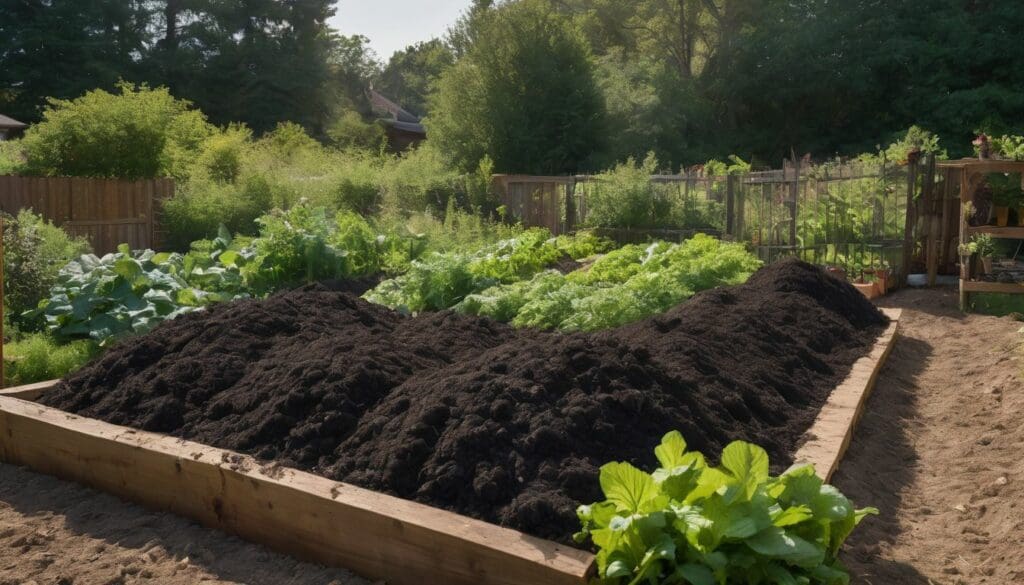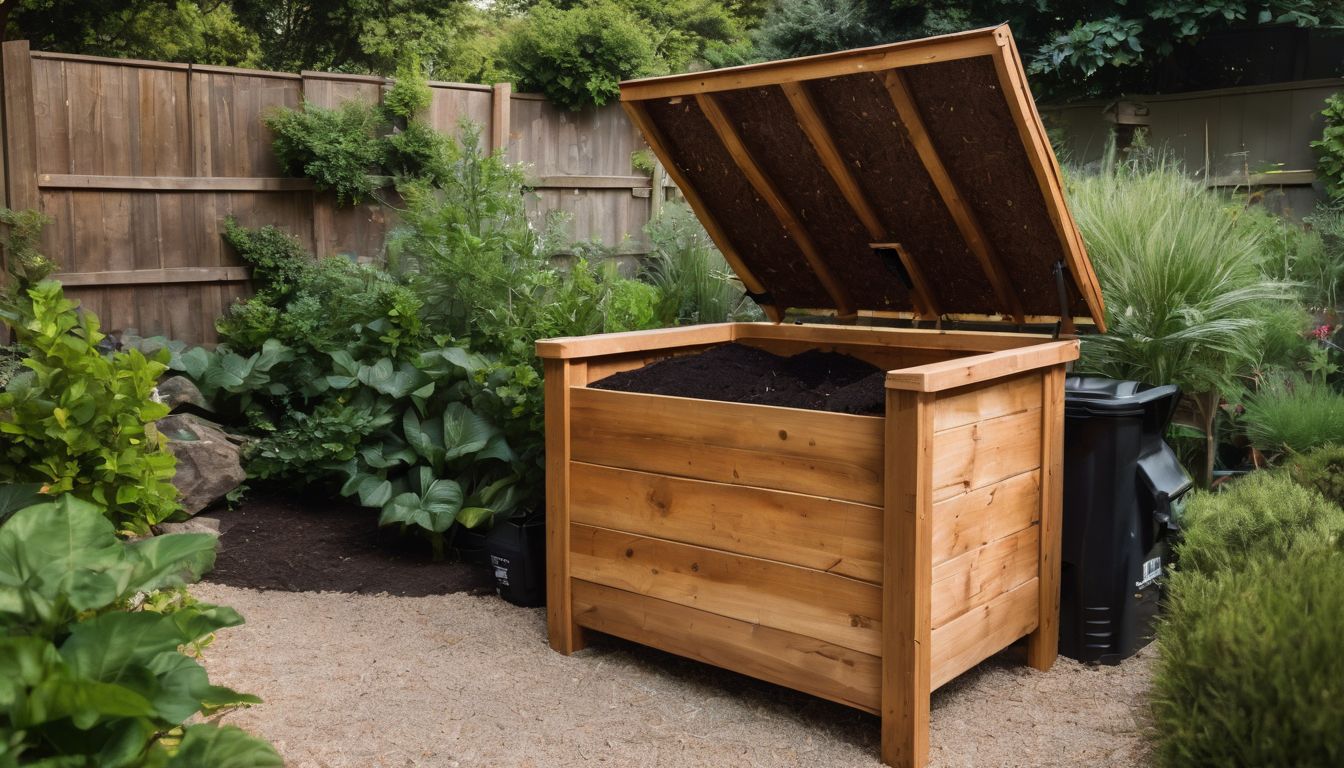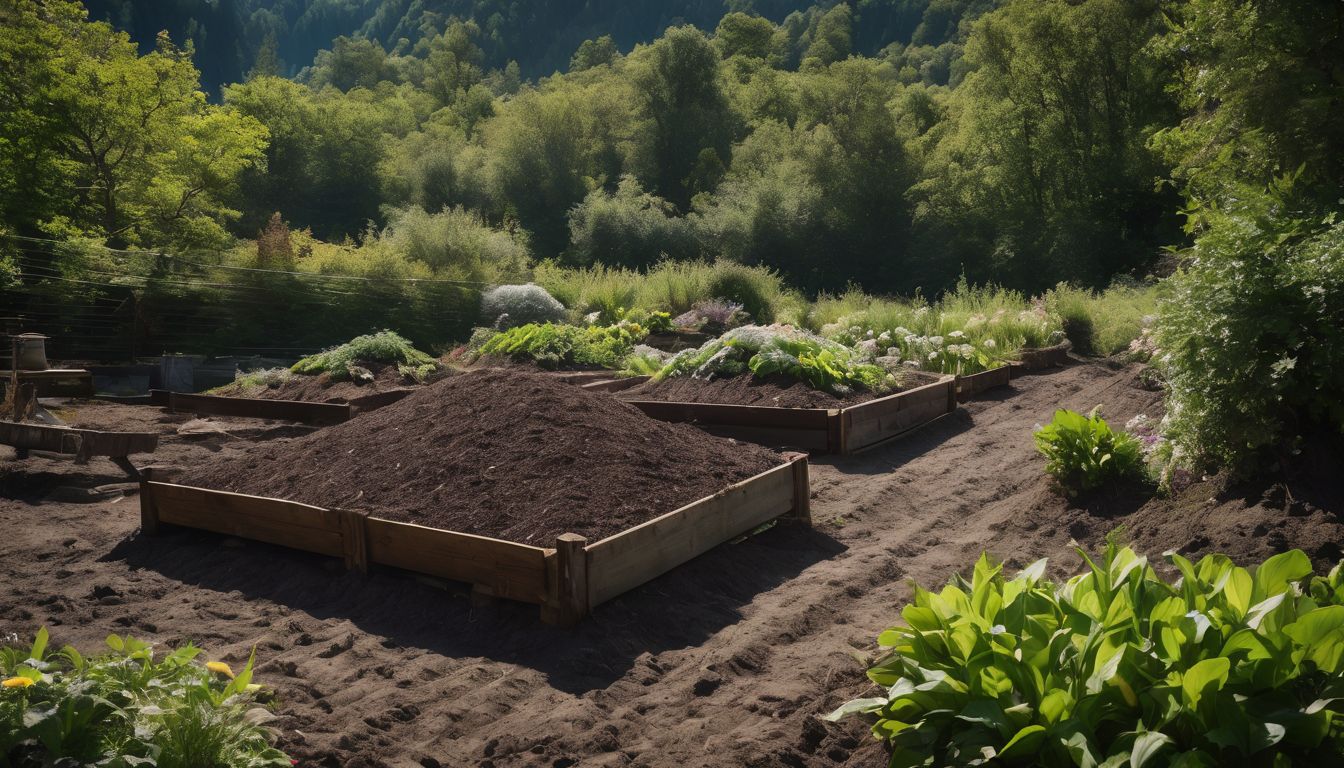Are you searching for ways to give your organic garden a boost? Compost is an eco-friendly powerhouse, brimming with nutrients that enrich the soil and support plant health. This article will guide you through making and using compost effectively to maximise your garden’s potential.
Dive in and let’s transform your green space!
Key Takeaways
- Compost enhances soil structure, helping it retain water and providing plants with essential nutrients for growth.
- Different composting methods such as traditional composting, vermicomposting, and trench composting can be utilised at home to create valuable soil amendments.
- Using the correct amount of compost is important; over or under-application can affect plant health and soil quality.
- Participating in community composting initiatives helps reduce waste going to landfills while promoting sustainable gardening practices.
- Implementing safety precautions when handling compost prevents potential contamination from harmful bacteria or pathogens.
What is Compost and its Benefits for Organic Gardening
Compost is a humus-like material that improves soil structure, water retention, and provides essential nutrients for plant growth. It also increases rooting depth and promotes healthy plant development in organic gardening.
Improves soil structure and water retention
Adding compost to your garden does wonders for the soil’s physical makeup. It loosens compacted earth, preventing hard clumps that can block roots from growing deeply. With better structure, the soil holds onto water more effectively, combating drought stress and reducing the need for frequent watering.
This creates a nurturing environment where plants thrive.
Compost acts like a sponge, soaking up moisture and gradually releasing it as plants require. Not only does this enhance water efficiency in organic gardening systems but also minimises erosion during heavy rains.
Healthier soils bolster plant resilience against unpredictable weather patterns, aiding conservation efforts and ensuring sustainable agriculture practices prevail.
Provides plant nutrients
Compost provides essential nutrients for plant growth, improving soil fertility and sustainability. Nutrient-rich compost supports healthy plant development and enhances the density of organic matter in the soil, making it more fertile.
This natural fertilisation method promotes the growth of beneficial microbes that contribute to plant nutrition without relying on synthetic chemicals.
When utilising compost for organic gardening, understanding its role in delivering vital nutrients is crucial. Let’s explore how different types of composting methods contribute to sustainable agricultural systems.
Increases rooting depth
Improving soil structure with compost encourages roots to grow deeper into the ground, accessing more water and nutrients. This helps plants become more resilient during dry periods and improves overall plant health through stronger root systems.
When compost is used in gardening, it promotes the growth of beneficial microorganisms which help create channels for air and water to penetrate deeper into the soil, encouraging roots to follow and strengthen their hold.
Compost also enhances soil porosity, increasing the space available for root growth. As a result, plants are better able to withstand environmental stressors such as drought or heavy rain by having access to a larger volume of healthy soil.
Promotes healthy plant growth
Increasing rooting depth encourages strong and healthy plant growth. Compost provides essential nutrients, maintains soil moisture, supports beneficial microorganisms, and enhances soil fertility.
This combination promotes vigorous plant growth, leading to healthier and more robust plants with increased resilience to pests and diseases.
The rich organic matter in compost also helps improve the overall health of the soil, resulting in improved nutrient retention and weed control. Additionally, the use of compost as a mulch protects the soil from erosion, aids in temperature regulation for root systems, and contributes to sustainable environmental practices.
Types of Composting for Home Use
Traditional composting, vermicomposting, and trench composting are popular methods for creating nutrient-rich soil amendments at home. Find out more about how these techniques can benefit your organic gardening practices by reading the full blog post!
Traditional composting
Traditional composting involves the decomposition of organic materials like fruit and vegetable scraps, coffee grounds, grass clippings, and leaves. These materials are placed in a compost bin or pile where microorganisms break them down to create nutrient-rich humus-like material.
It’s important to turn the pile regularly to ensure consistent aeration for optimal decomposition. Maintaining a balance of browns (carbon-rich materials) and greens (nitrogen-rich materials) is essential for successful traditional composting, helping it reach high temperatures that kill weed seeds and harmful pathogens.
To initiate traditional composting at home, gather organic scraps such as fruit peels, eggshells, and yard waste in a designated area within your garden or backyard. Regularly turning the compost using a pitchfork or shovel will help oxygenate it and speed up the decomposition process.
Vermicomposting
Moving from traditional composting methods to a more innovative approach, vermicomposting involves using earthworms to break down organic materials into nutrient-rich compost. Earthworms consume organic waste and excrete castings rich in beneficial microbes, enzymes, and plant nutrients that enhance soil fertility.
By introducing earthworms into the composting process, it accelerates the decomposition of organic matter, producing humus-like material that improves soil structure and water retention.
Vermicomposting also encourages the growth of soil microorganisms essential for maintaining healthy soil density and promoting disease prevention in organic gardening practices.
Trench composting
Moving from vermicomposting to trench composting, this method involves digging a trench in the garden soil and filling it with organic materials such as food scraps, yard waste, and other biodegradable matter.
The trench should be about 12 inches deep and covered with a layer of soil once filled. Over time, the organic materials decompose and enrich the surrounding soil with nutrients. Trench composting not only improves soil fertility but also helps in retaining moisture and enhancing microbial activity, making it an effective way to recycle kitchen waste while nurturing your garden.
Additionally, trench composting significantly reduces the need for transferring organic scraps off-site for disposal, thus contributing positively to environmental stewardship. By integrating this simple yet efficient technique into your gardening routine, you can actively participate in sustainable practices that benefit both your crops and the environment.
Essential Ingredients for Composting
Organic scraps and garden clippings are essential for composting, along with consistent aeration, temperature control, and moisture maintenance. These ingredients help create nutrient-rich soil that is beneficial for organic gardening.
Organic scraps and garden clippings
Organic scraps and garden clippings are crucial components for creating nutrient-rich compost. These materials, such as fruit and vegetable peels, coffee grounds, leaves, and grass cuttings, provide essential organic matter to enrich the soil.
As these scraps decompose, they release valuable nutrients into the compost that can later benefit plants in the garden. By incorporating these organic materials into your composting process, you can contribute to the creation of healthier soil while significantly reducing waste.
When integrating organic scraps and garden clippings into your compost pile or bin, it’s important to maintain a good balance between “green” nitrogen-rich materials like kitchen scraps and “brown” carbon-rich materials like dried leaves or wood shavings.
Consistent aeration
After gathering organic scraps and garden clippings, the next key element for successful composting is consistent aeration. This vital process ensures that oxygen reaches all parts of the compost pile or bin, facilitating the breakdown of materials and preventing unpleasant odours.
Regularly turning or mixing the compost helps to maintain airflow and promote aerobic decomposition, creating an ideal environment for beneficial microorganisms to thrive. By incorporating consistent aeration into your composting routine, you can accelerate the decomposition process and produce nutrient-rich compost for your organic gardening needs while reducing waste and supporting soil health.
Temperature control
To maintain the optimal conditions for composting, controlling the temperature is crucial. Adequate heat is essential for breaking down organic materials effectively and preventing pathogens from thriving.
Turning the compost pile regularly helps to distribute heat evenly and maintain a consistent temperature throughout, ensuring an efficient breakdown of materials and promoting beneficial microbial activity.
Monitoring the internal temperature of the compost pile periodically allows adjustments to be made if necessary, creating an ideal environment for decomposition.
Moisture maintenance
Maintaining the correct moisture levels in compost is crucial for successful decomposition. Excessively wet conditions can lead to anaerobic decomposition and unpleasant odours, while overly dry conditions slow down the process.
To maintain optimal moisture, regularly check the compost pile and add water or more organic matter as needed. A good rule of thumb is to keep the compost damp but not soaked, similar to a wrung-out sponge.
Balancing moisture levels in your compost ensures a healthy environment for microorganisms to break down organic materials effectively and efficiently. The next step after maintaining proper moisture is understanding how to utilise this nutrient-rich compost in your garden.
Proper Usage of Compost in Organic Gardening
When using compost in organic gardening, it’s important to remember its benefits for mulching, fertilising, disease suppression and enhancing soil fertility. Read on to learn more about how to properly use compost in your garden.
Mulching
Mulching involves covering the soil around plants with a layer of compost to retain moisture, suppress weeds, and regulate soil temperature. This process also enriches the soil by slowly releasing nutrients as it breaks down, creating a healthy environment for plant roots to thrive.
Mulching helps reduce the need for frequent watering and protects the soil from erosion due to rain or strong winds.
The use of mulch in organic gardening promotes sustainable practices by improving soil quality and reducing reliance on chemical fertilisers and pesticides. In addition to its environmental benefits, mulching enhances the visual appeal of garden beds and provides a natural habitat for beneficial insects.
Fertilising
After mulching, the next crucial step in utilising compost for organic gardening is fertilising. Compost provides a natural source of nutrients, promoting healthy plant growth and enhancing soil fertility.
When properly applied, it enriches the soil with essential elements required for robust plant development. This nutrient-rich soil also aids in pest control and disease suppression while supporting organic farming practices that protect the environment.
Fertilising with compost ensures that plants have access to vital nutrients without relying on synthetic chemicals. The process leads to improved soil structure and water retention as well as increased rooting depth, all contributing to better overall garden health.
Disease suppression
Compost plays a vital role in organic gardening by assisting in disease suppression. The beneficial microorganisms found in compost help to ward off harmful plant pathogens, promoting healthier and more resilient plants.
By enhancing the soil’s natural abilities to resist diseases, compost aids in creating a balanced and thriving ecosystem within the garden, thus reducing the need for chemical interventions that can harm the environment.
Additionally, rich soil from compost provides essential nutrients and increases overall plant health, helping them fend off diseases naturally. This results in a sustainable approach to gardening that supports environmental conservation while yielding healthy and bountiful crops without relying on harmful pesticides or herbicides.
Enhancing soil fertility
To enhance soil fertility, incorporate compost into your organic gardening routine. Compost enriches the soil with essential nutrients, such as nitrogen and phosphorus, which are vital for plant growth.
It also promotes the growth of beneficial microorganisms that aid in nutrient absorption by plants. The organic matter in compost helps improve soil structure and water retention while providing a healthy environment for plant roots to thrive.
By integrating compost into your gardening practices, you contribute to creating a nutrient-rich soil that fosters sustainable and thriving plant life.
Appropriate application rates
When applying compost to your garden, it is crucial to use the correct application rates. Over-application can lead to nutrient imbalances and potential harm to plant roots, while under-application may not provide the full benefits of compost.
It’s essential to follow recommended guidelines based on the type of plants and soil conditions in order to achieve optimal results for your organic garden.
Understanding the appropriate application rates ensures that you can effectively improve soil organic matter, enhance soil fertility, promote healthy plant growth, and protect the environment.
Community Composting and Outsourcing Options
Explore the benefits of community composting and outsourcing composting services to support sustainable gardening practices and reduce waste. Learn about tips for preventing fruit flies, safety precautions, and related resources.
Read on to discover how you can make a positive impact on the environment through community composting.
Benefits of community composting
Community composting offers a range of benefits for environmentally-conscious individuals. By participating in community composting initiatives, you can help reduce the amount of organic waste being sent to landfills, ultimately contributing to soil protection and improvement.
Additionally, community composting fosters a sense of shared responsibility for environmental conservation among members, promoting nutrient-rich soil and supporting sustainable gardening practices.
Moreover, engaging in community composting provides an opportunity to connect with like-minded individuals who are also committed to reducing their environmental impact. This collaborative effort not only enhances local soil fertility but also helps create a supportive network focused on promoting eco-friendly gardening practices within the community.
Outsourcing composting services
Consider outsourcing composting services if you lack time or space for at-home composting. Many local waste management companies offer organic waste collection and processing services, providing a convenient solution for environmentally conscious individuals.
By participating in these programs, you can contribute to the larger community effort of reducing landfill waste and producing valuable compost for local gardens. Research local options and enquire about their processes to find a service that aligns with your conservation goals.
Remember to choose a reputable provider that adheres to responsible composting practices to ensure the high quality of the end product.
Tips for preventing fruit flies
When considering the management of organic waste, preventing fruit flies is essential to maintain a clean and efficient composting system. Here are some tips for preventing fruit flies:
- Covering food scraps with a layer of dry leaves or shredded paper can help deter fruit flies from laying eggs in the compost.
- Turning and aerating the compost regularly will discourage fruit fly infestations as it disrupts their breeding environment.
- Keeping the compost pile moist but not too wet is crucial in discouraging fruit flies from breeding, as they prefer damp environments for egg-laying.
- Using a well – sealed compost bin or adding a lid to an open pile can prevent access for adult fruit flies.
- Avoiding overripe fruits and vegetables in the compost will also help to reduce the attraction of fruit flies to the area.
- Placing traps near the compost area using apple cider vinegar or banana peels as bait can help control fruit fly populations.
- Emptying and cleaning out any containers that may have accumulated liquid or decaying material will further deter fruit fly infestations.
Safety precautions
When using compost in your organic garden, it’s crucial to practice safety precautions to ensure the well-being of both yourself and your plants. To prevent potential contamination from harmful bacteria or pathogens present in raw materials, always wear gloves and wash your hands thoroughly after handling compost.
Additionally, be mindful of the temperature within your compost pile as high temperatures could cause spontaneous combustion – ensure proper aeration to regulate heat levels. Lastly, avoid using any diseased plant material for composting, as it can lead to the spread of diseases among healthy plants.
Related resources
To further support your organic gardening efforts, consider exploring additional resources such as online forums, gardening communities, and local workshops. These platforms offer valuable insights, tips, and experiences shared by fellow environmentally conscious individuals.
Additionally, seek out educational materials from reputable organisations dedicated to conservation and environmental sustainability. By delving into these resources, you can expand your knowledge on composting techniques, soil enrichment methods, and sustainable gardening practices.
For in-depth guidance on community composting initiatives or outsourcing options for your organic waste management needs – reach out to local environmental groups and municipal authorities for information on available programmes or services in your area.
Conclusion
In conclusion, compost plays a crucial role in organic gardening. It improves soil structure and nutrient content, benefiting plant growth. Utilising various composting methods at home provides environmentally friendly solutions for waste reduction.
As individuals embrace the use of compost in gardening, they contribute to sustainable environmental practices. Understanding the advantages and proper usage of compost empowers gardeners to promote healthy ecosystems through their gardening efforts.
FAQs
1. What role does compost play in organic gardening?
Compost acts as a soil improver, making garden earth nutrient-rich which is vital for healthy plant growth in organic gardening.
2. How does compost help the soil?
Compost enriches the soil with vital nutrients and helps to create a fertile environment that aids plant roots in absorbing minerals and water more effectively.
3. Can I make my own garden compost?
Yes, you can make your own garden compost by recycling kitchen scraps and garden waste into valuable, nutrient-packed material that benefits your organic garden.
4. Is it necessary to use compost in an organic garden?
Using compost is highly recommended for organic gardens because it naturally boosts soil health without the need for chemical fertilisers, creating a sustainable way of gardening.





